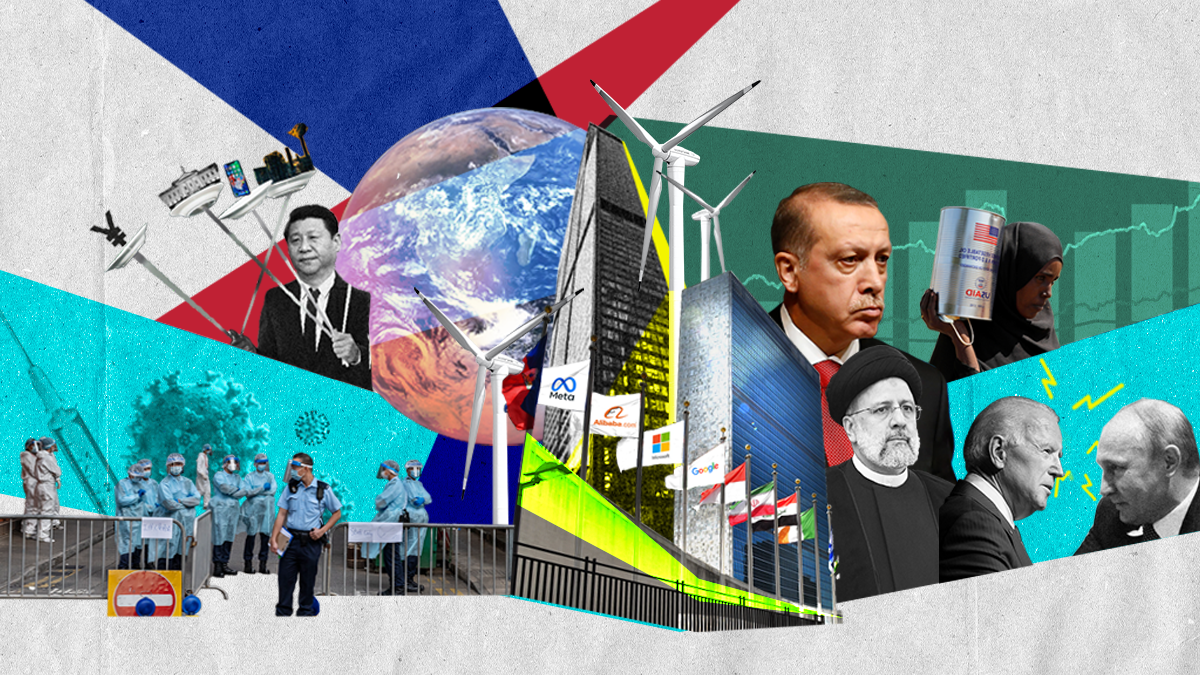Every January, Eurasia Group, our parent company, produces a report with its forecast for the Top 10 Risks for the world in the year ahead. Its authors are EG President Ian Bremmer and EG Chairman Cliff Kupchan.
Next Tuesday morning, the 2023 report will drop, and we’ll let you know what’s in it. But today, we’ll look back at EG’s predictions for 2022. What did Bremmer and Kupchan nail, and where were they wrong?
Disclaimer: Your Signal author has contributed to these Top Risks reports for the past 18 years.
A year ago, these were EG’s Top 10 risks…
1. No Zero COVID: China’s zero-COVID policy will disrupt China and the global economy.
2. Technopolar world: Information technologies that govern the way we live, interact, vote, work, and do business will disrupt our lives, and big tech companies will do little to help.
3. US midterms: Results of congressional and state elections will set the stage for a potential constitutional crisis in 2024.
4. China at home: The pandemic and a series of longer-term problems will weigh heavily on China’s economy.
5. Russia: Diplomacy will probably prevent a full invasion of Ukraine, but Russia’s relations with the West will get much worse.
6. Iran: Tensions between Iran and the West will intensify.
7. Two steps greener, one step back: COVID recovery will slow the transition to greener energy.
8. Empty lands: A lack of global leadership will allow chronic conflicts to worsen and pose new threats in Afghanistan, Yemen, Venezuela, and other exporters of instability.
9. Corporates losing the culture war: Cancel culture and the growing power of social media as a weapon for activism will force large companies to spend more time and money navigating political minefields.
10. Turkey: President Recep Tayyip Erdoğan will drag Turkey’s economy and international standing to new lows.
There were also three “red herrings,” risks that EG considered overrated: The US and China will not descend into Cold War 2.0; a presidential election will not threaten Brazil’s democracy; and there will be no migration crisis in Europe.
Here’s the full 2022 report.
So, what did Eurasia Group get right? Bremmer, Kupchan, and EG’s China team were warning that China’s lockdown and testing intensive zero-COVID policy would last longer than many expected, would inflict considerable pain on China’s economy, and would stoke social unrest.
They also saw that China’s problems in 2022 would extend well beyond COVID, even as leader Xi Jinping consolidated more power.
They were right that Brazil’s election might generate controversy and even violence, but that a peaceful transfer of power would follow.
And they were correct that US-China hostilities would remain better contained than some feared, though one of the primary reasons for that leads us directly into the report’s biggest shortcomings.
What did EG get wrong? Bremmer and Kupchan did not believe Russia would launch a full-on invasion of Ukraine. (Apparently, many of Vladimir Putin’s generals shared that mistaken view.) The report acknowledged that a much more limited military incursion was possible, but they did not foresee how far Putin would go – or that Russia’s military failures in Ukraine would make China’s government more cautious in relations with the US and Europe.
Bremmer and Kupchan were also too pessimistic about the willingness of American voters to reject the candidacies of 2020 election deniers at the state level, though many did win seats in the House of Representatives. The risk of a major constitutional confrontation in 2024 is now much lower than some feared a year ago.
Finally, though there was no new flow of refugees from the Middle East into Europe, missing the full-on Russian invasion meant missing the flow of millions of Ukrainians into Poland and other neighboring countries.
Watch this space. On Tuesday morning, we’ll give you a look at Bremmer and Kupchan’s predictions for 2023, and we hope you’ll tell us what you think of them.
